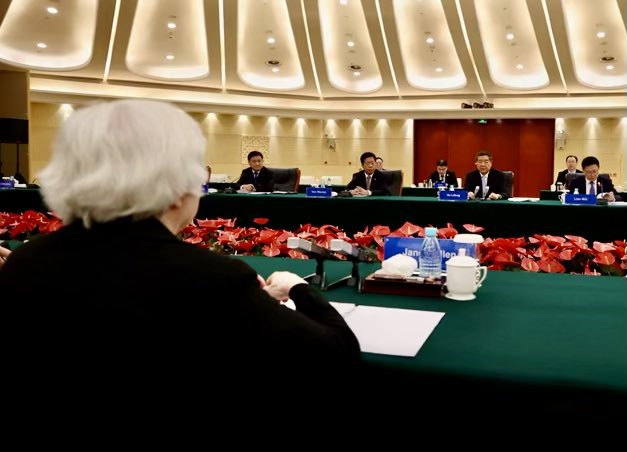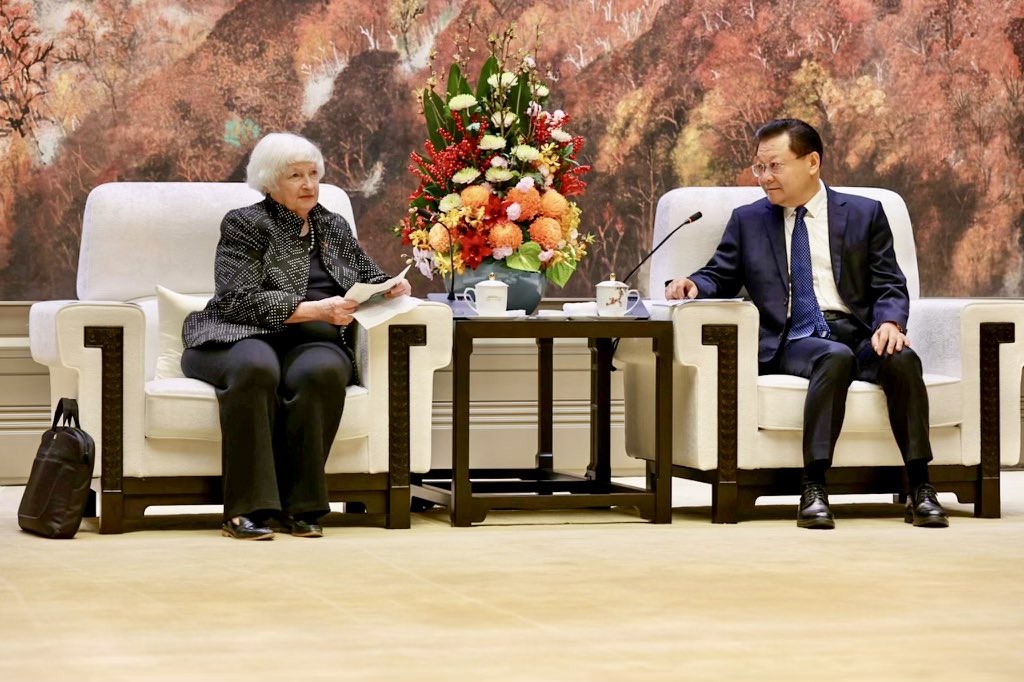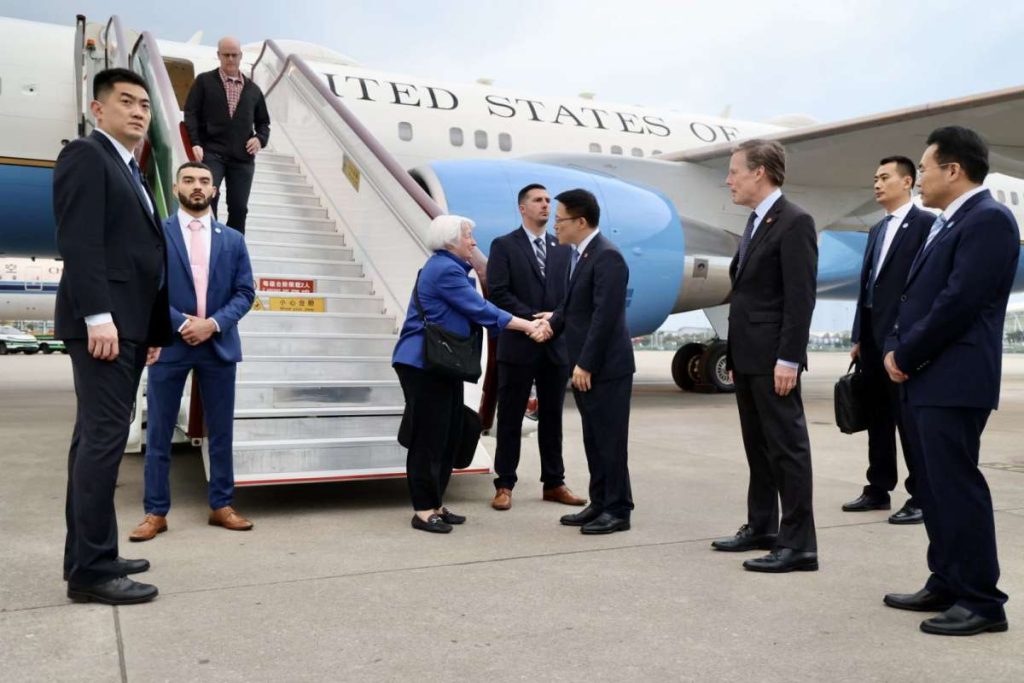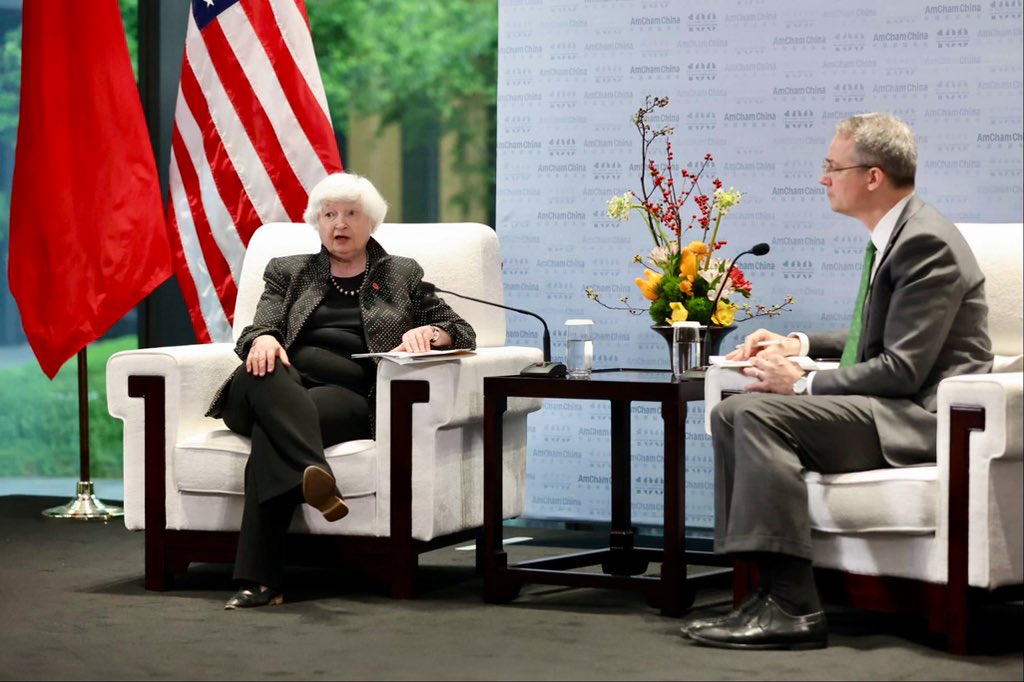
Janet Yellen, who is on a five-day visit to China, has raised concern with Chinese officials regarding state subsidies that fuel manufacturing overcapacity in industries like electric vehicles, solar panels and semiconductors, reports Asian Lite News
US Treasury Secretary Janet Yellen, who is on five-day visit to China, has urged Chinese officials to address its industrial overcapacity, reform its trade practices and create a “healthy economic relationship” with the United States, VOA News reported.
Yellen, who is on a five-day visit to China, has raised concern with Chinese officials regarding state subsidies that fuel manufacturing overcapacity in industries like electric vehicles, solar panels and semiconductors.
In her remarks in China’s Guangzhou, Yellen said, “The United States seeks a healthy economic relationship with China that benefits both sides.” She added, “But a healthy relationship must provide a level playing field for firms and workers in both countries.”
She also held a meeting with Chinese Vice Premier He Lifeng and other high-level central bank officials on Friday. During the meeting, Yellen told Chinese officials that their industrial overcapacity, especially in green energy sectors, threatens American production of electric vehicles and solar panel parts, VOA News reported.

China has backed its solar panel and EV makers through subsidies, building production capacity far beyond the domestic market’s demand and exporting its products across the world. The production has cheapened prices for these green products. The US and European governments have expressed worry that Chinese products will flood the market and put their own domestic production at risk.
During a meeting with Guangdong province Governor Wang Weizhong, Yellen said the US and China must hold talks on areas of disagreement, including green industrial policy. She said, “This includes the issue of China’s industrial overcapacity, which the United States and other countries are concerned can cause global spillovers.”
China has tried to downplay these concerns, with Chinese Foreign Ministry spokesperson Wang Wenbin earlier this week saying that China’s green production is a positive in global efforts to reduce carbon emissions. Wang said US reluctance to export technology to China meddles with global supply and demand.
Wang Wenbin said, “As for who is doing nonmarket manipulation, the fact is for everyone to see.” He said, “The US has not stopped taking measures to contain China’s trade and technology. This is not ‘de-risking,’ rather, it is creating risks,” VOA News reported.
During her visit to China, Yellen also expressed concerns about Chinese trade practices. She said that China has been using “unfair economic practices, including imposing barriers to access for foreign firms and taking coercive actions against American companies.” She called on Chinese officials to reform these policies.

In her address at an event hosted by the American Chamber of Commerce in Guangzhou, Yellen said, “I strongly believe that this doesn’t only hurt these American firms.” She further said, “Ending these unfair practices would benefit China by improving the business climate here.”
Yellen’s visit to China marks the first visit by a senior US official to China since November meetings between US President Joe Biden and Chinese counterpart Xi Jinping.
Jenet Yellen said, “It also remains crucial for the two largest economies to seek progress on global challenges like climate change and debt distress in emerging markets in developing countries and to closely communicate on issues of concern such as overcapacity and national security-related economic actions.”
She further said that efforts to push Chinese policies are geared towards reducing global risk. Yellen noted, “This is not anti-China policy” and called it an effort by the US “to mitigate the risks from the inevitable global economic dislocation that will result if China doesn’t adjust its policies.”
On Friday, Yellen stated in a post on X, “Many American business executives have expressed the challenges of operating in China. I’ll also discuss with my Chinese counterparts the risks associated with overcapacity. These exchanges will help lead to building a healthy bilateral economic relationship.”

US officials and economists have warned that China’s overcapacity will further reduce prices and cost jobs, particularly if Beijing wants to offload excess production through exports rather than domestic consumption.
During the telephonic conversation with Chinese President Xi Jinping on Tuesday, US President Joe Biden said China’s “unfair” trade policies and “non-market” practices harm the interests of US workers and families, VOA News reported.
While addressing a regular briefing on Wednesday, China’s Foreign Ministry spokesperson Wang Wenbin said that Biden and Xi Jinping spoke on trade. He said, “the US has adopted a string of measures to suppress China’s trade and technology development and is adding more and more Chinese entities to its sanctions lists. This is not ‘de-risking,’ but creating risks.”
Gary Clyde Hufbauer, a senior fellow at the Peterson Institute for International Economics, said that for capital-intensive industries like steel, oil refining and semiconductors, when capacity utilisation is below 75 per cent for an extended period of time, the majority of observers would call it excess capacity.
Speaking to VOA News, Hufbauer said that China’s government-stimulated and bank-financed investment has led to almost all of China’s capital-intensive manufacturing industries having overcapacity.
He said, “If China does pursue a massive export ‘solution,’ that will hurt manufacturing firms in Japan, the EU, Korea and other industrial countries. But low prices will be welcome in many developing countries in Latin America, Africa and Asia.”
Last week the VOA cited a report by New York-based Rhodium Group, which researches the Chinese market, stating that the utilisation rate of China’s silicon wafer capacity witnessed a drop from 78 per cent in 2019 to 57 per cent in 2022.

In 2022, China’s lithium-ion battery production reached 1.9 times the domestic installation volume, which demonstrates that overcapacity in clean energy fields is emerging.
China’s exports of electric vehicles, solar cells and lithium batteries have witnessed a rise even more significantly. According to 2023 data, China’s electric vehicle export volume was seven times that of 2019, while its solar cell export volume in 2023 was five times that of 2018, which shows a rise of 40 per cent from 2022.
According to the report, temporary overcapacity might be harmless and a normal part of the market cycle. However, it becomes a problem when it is perpetuated by the involvement of the government.
The report released by the Rhodium Group said that China’s National People’s Congress in March focused on industrial policies that provide benefits to high-tech industries, while there is little financial support for household consumption.
The report said, “This policy mix will compound the growing imbalance between domestic supply and demand.” It said, “Systemic bias toward supporting producers rather than households or consumers allows Chinese firms to ramp up production despite low margins, without the fear of bankruptcy that constrains firms in market economies.” (ANI)
ALSO READ: US-Japan security alliance upgrade worries China


